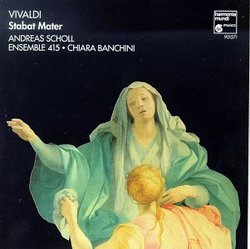| All Artists: Antonio Vivaldi, Chiara Banchini, Ensemble 415, Andreas Scholl Title: Vivaldi: Stabat Mater /Scholl * Ensemble 415 * Banchini Members Wishing: 0 Total Copies: 1 Label: Harmonia Mundi Fr. Release Date: 1/23/1996 Album Type: Import Genres: Pop, Classical Styles: Vocal Pop, Opera & Classical Vocal, Chamber Music, Forms & Genres, Concertos, Historical Periods, Baroque (c.1600-1750), Classical (c.1770-1830), Sacred & Religious Number of Discs: 1 SwapaCD Credits: 1 UPC: 794881335725 |
Search - Antonio Vivaldi, Chiara Banchini, Ensemble 415 :: Vivaldi: Stabat Mater /Scholl * Ensemble 415 * Banchini
 | Antonio Vivaldi, Chiara Banchini, Ensemble 415 Vivaldi: Stabat Mater /Scholl * Ensemble 415 * Banchini Genres: Pop, Classical
![header=[] body=[This CD is available to be requested as disc only.]](/images/attributes/disc.png?v=430e6b0a) ![header=[] body=[This CD is unavailable to be requested with the disc and back insert at this time.]](/images/attributes/greyed_disc_back.png?v=430e6b0a) ![header=[] body=[This CD is available to be requested with the disc and front insert.]](/images/attributes/disc_front.png?v=430e6b0a) ![header=[] body=[This CD is unavailable to be requested with the disc, front and back inserts at this time.]](/images/attributes/greyed_disc_front_back.png?v=430e6b0a) |
Larger Image |
CD Details |
CD ReviewsRevelatory hcf | 11/27/1999 (5 out of 5 stars) "The critics are right: this recording is remarkable. This CD has won a Gramophone award, 4f Telerama, 10 Repertoire, and a Diapason d'Or. It has also made the list of the 50 Best Baroque Recordings (BBC Music). Listen: I'm not even a particular fan of Andreas Scholl, but this is one of my most favorite recordings (in a collection that numbers almost 1,000 CD's). Scholl is uniquely suited to the repertory such as this. His angelic voice may not always rise to the occasion in opera (although his performance in Solomon certainly challenges this assumption), but that same angelic voice is always at home in sacred music - blending calm reverence with a hint of emotion, in a manner that is both beautiful and heart-breaking. Listen to his Stabat Mater to know what I mean. Scholl's voice is also quite at home in the secular cantata Cessate Omai Cessate, a cry of unrequited love, albeit more elegaic than passionate. At the surface, this recording, featuring some of the world's most beautiful melodies, is an easy listening (is there a melody more ravishing than Larghetto from Cessate?). But the listening is also revelatory and rewarding because it leads to new layers of meaning and expression on each new listen. gkolomietz@yahoo.com" Fireworks and sacred pathos J. R. Gunsell | Cambridge, UK | 10/08/2000 (5 out of 5 stars) "Almost everything Ensemble 415 records is worth buying. With Andreas Scholl as soloist, this must be the star in their crown to date.The secular cantata Cessate, omai Cessate is a real bonus. It's said to be "popluar" although personally I cannot remember having seen it advertised in live performance, ever. It's a flashy show-off piece for countertenor, and Andreas Scholl has plenty to show off. You won't hear vocal fireworks like this very often. First time hearing it will take your breath away ... make your hair stand on end. The intro to the Stabat Mater - in full, not abbreviated as in some recordings - is the sacred mood music Filae Maestae Jerusalem. This piece brings the house down whenever it is performed live, too rarely, and Scholl gives it incredible depth. The steady, ominous rhythm is fabulously rendered by Chiara Banchini. The Stabat Mater itself continually builds and falls away again as the insights of the writer of the original poem are successively laid before us. Andreas Scholl gives each stanza its own full impact but never loses the flow of the narrative. The last sections, in which the witness (of the Mother's agony at her Son's execution) turns from spectator to pray-er, are a miracle of sensitivity and expression. Andreas Scholl is a master." A Vivaldi to nourish the soul.. AH | Australia | 06/10/2000 (5 out of 5 stars) "This is without doubt an amazing dics! Vivaldi's setting of the Stabat Mater is simple yet profoundly moving and life enriching.. personally, I found it touched me more than Pergolesi's beautiful version. Coupled with a secular cantata (Cessate omai cessate), and several other instrumental works, it is not hard to see why Vivaldi's music has stood the test of time. Scholl by far, has proven himself a true and most gifted artist. With a honey-toned voice, he weaves for us a delightful canvas of sound (notably in the arias of 'Cessate' track 5 and 7 and the Stabat Mater), and the ease of his vocal techniques and abilities is quite remarkable. The only other Stabat Mater I own is the Kowalski/Negri on Philips, and I have yet to hear the Chance/Pinnock on DG. But comparing the Scholl and Kowalski, one finds that Scholl takes the opportunity to stroll and allow the words to 'breathe', thus making it more meaningful and reflective, most notably in the adagio "Quis non posset" of the Stabat Mater. Listening to this, it is hard to argue that this is music of aching beauty and it never fails to touch the soul.The accompaniment of Banchini & Ensemble 415 is flawless and forms a very intimate partnership with Scholl. It's good that they are given the chance to shine in the string works.All in all, this disc is an amazing achievement and quite deservedly winner of the Gramaphone Baroque Vocal Award for 1996.Happy Listening!"
|

 Track Listings (21) - Disc #1
Track Listings (21) - Disc #1